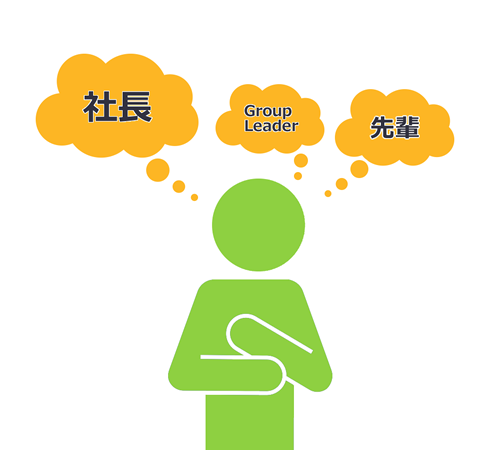
ランチタイムイベント「おべんと食べよ!」を開催しました
KTC合宿 ~お互いの価値観を知る事が、関係作りの第一歩~
休業・休職者の代替要員を支援する「すけだち報酬制度」を新たにスタート
2025年度の働き方 ~オフィス出社日の設定とコミュニケーション②~
2025年度の働き方 ~オフィス出社日の設定とコミュニケーション①~
新年度キックオフイベント「SPRING MEETING 2025」を開催しました
東京都の「Tokyo Career Guide 東京で働こう」にて当社が紹介されました!
「仕事」と「育児」と「介護」の両立(社員エッセーより)
育児・介護休業法改正に伴う社内ルール見直しポイント
インド子会社からのメンバーの来日対応について/The Visit of Members from Our Indian Subsidiary
Workplace terms of address
Japan is known for its seniority culture, where levels of respect are dependent on seniority (age, experience, etc.), and this appears in the language of workplace culture as well.

There are different terms of address used for different corporate positions, such as titles (department leader, director, etc.)
Other common terms of address are related to age, like the honorific senpai. (Note: in many cases, within the workplace, senpai is used for employees with more experience than you; however, this gets tricky to navigate in the case where you have more workplace experience than a person older than you. This is a thorny area even for Japanese people, so be sure to feel it out on a case-by-case basis.)
Different companies have different rules with regard to workplace titles and honorifics. Some are very strict, while others, not at all. At e-Jan Networks, corporate titles are rarely used, and everyone is addressed with the -san honorific.
These rules for workplace terms of address can be an indicator for the company’s culture and style, which is a notable factor when considering working in Japan.
As mentioned, every company has its own style, and navigating these often unspoken rules can sometimes be challenging, but with practice it becomes second-nature!
- N

There are different terms of address used for different corporate positions, such as titles (department leader, director, etc.)
Other common terms of address are related to age, like the honorific senpai. (Note: in many cases, within the workplace, senpai is used for employees with more experience than you; however, this gets tricky to navigate in the case where you have more workplace experience than a person older than you. This is a thorny area even for Japanese people, so be sure to feel it out on a case-by-case basis.)
Different companies have different rules with regard to workplace titles and honorifics. Some are very strict, while others, not at all. At e-Jan Networks, corporate titles are rarely used, and everyone is addressed with the -san honorific.
These rules for workplace terms of address can be an indicator for the company’s culture and style, which is a notable factor when considering working in Japan.
As mentioned, every company has its own style, and navigating these often unspoken rules can sometimes be challenging, but with practice it becomes second-nature!
- N










